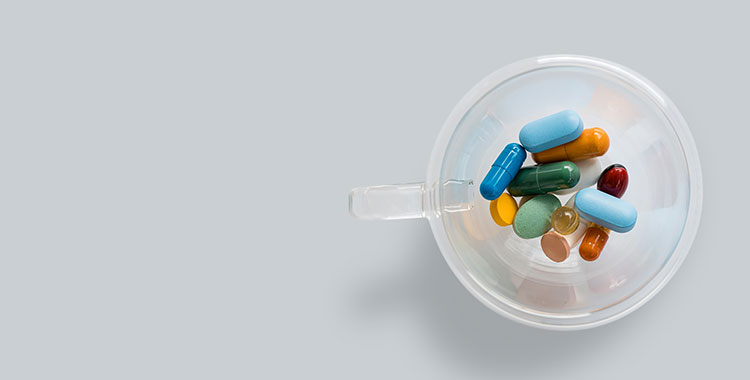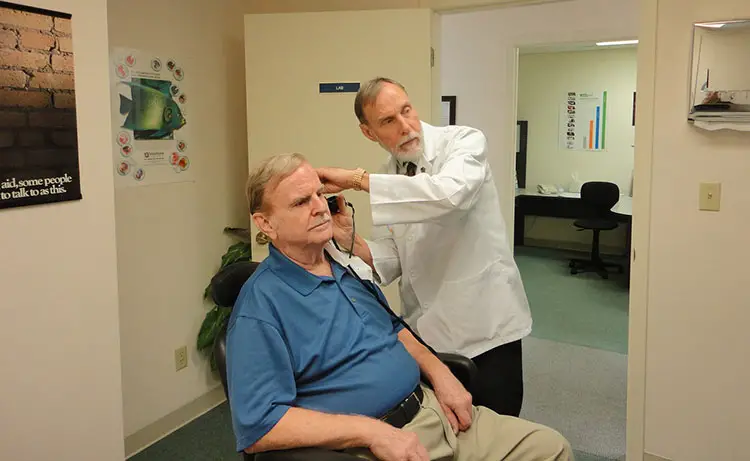It is estimated that over 5% of the world’s population required rehabilitation to address their disabling hearing loss (source). There are many ways to address hearing loss, but in this article we are going to look specifically at vitamins for hearing loss.
On the list of disabilities as we age, hearing loss stands even higher than many other chronic diseases such as diabetes, dementia, and chronic obstructive pulmonary disease (COPD).
Hearing loss affects someone’s quality of life. Communication and relationships are seriously affected by it. It’s also been associated with depression and anxiety. When children have hearing loss, they often have poor performance in their schoolwork and show speech, language and cognition delays.
Adults with poor hearing have been found to have lower wages and risk unemployment according to some studies. And recently, a connection between hearing impairment and dementia in the elderly has been reported.
One of the things that people may not realize about hearing loss is that it’s often not a state of complete silence. It can be accompanied by very loud ringing in the ears and/or pain in the ears, dizziness or the feeling that the room is spinning. Sometimes there may be the sound of rhythmic thumping or throbbing that coincides with the heartbeat.
And of course, there is much difficulty understanding what is spoken, especially in a noisy restaurant or in a crowd. Those with hearing loss are often turning up the volume of the radio or television, usually to levels that annoy other family members, find the need to look for cellphones for the hearing impaired, and other accommodations.
Can a Vitamin Deficiency Cause Hearing Loss?
It’s surprising to many people, but the answer is yes! In 2019, three Korean ENT doctors at a school of medicine in Seoul reported in the medical journal called Nutrients that there were many nutrient deficiencies associated with hearing loss. It wasn’t just vitamin deficiency that caused hearing loss; mineral deficiencies did, too.
Best Minerals and Vitamins for Hearing Loss
The best vitamins for hearing loss could be represented by the very vitamins (and minerals) whose deficiencies can be associated can with hearing loss. These vitamins and minerals include: Magnesium; Selenium; Iron; Iodine; Vitamins A, B2, C, D, E, B9, B12; and Zinc.
Of course, you don’t know what you might be deficient in until you have lab work, so consult with your doctor first and foremost.
For ease of shopping, the vitamins are assembled in the table below with purchase link:
| Vitamin for Hearing Loss | Purchase Link |
|---|---|
| Magnesium | Amazon |
| Selenium | Amazon |
| Iron | Amazon |
| Iodine | Amazon |
| Vitamin A | Amazon |
| Vitamin B2 | Amazon |
| Vitamin C | Amazon |
| Vitamin D | Amazon |
| Vitamin E | Amazon |
| Vitamin B9 | Amazon |
| Vitamin B12 | Amazon |
| Zinc | Amazon |
When any of these nutrients are deficient, the incidence of hearing loss increases.
But one thing you should know is that these researchers also mentioned that not eating enough protein or eating higher amounts of carbohydrates, fat and cholesterol were culprits in poorer hearing status. The higher amounts of carbohydrates in the diet are seen in those consuming a lot of processed foods, junk food, and fast foods. Obesity and underweight were also a risk factor for hearing loss.
Other studies have shown that infants with poor nutritional status were significantly more likely to have severe sensory nerve impairment than infants without nutritional deficiencies.
Nutritional Factors to Consider
Any of the above-mentioned vitamins and nutrients may help hearing. However, in nutrition, you have to consider a few basic facts:
- Taking supplements of nutrients that you don’t need won’t make you into a superman (or woman). The amount of benefit you get will only reach a top level and then stop. If you don’t need a nutrient and have hearing loss, you can’t expect that supplementing with a nutrient that you don’t need will help your sense of hearing. What this tells you is that you need a full nutritional work-up to determine what you need and what you don’t.
- Nutrient deficiencies are never found singly. If you’re deficient in one of the B vitamins, the chances of you being deficient in other B vitamins is high. This is because the B vitamins work together in the body.
- Nutrients work in the body in ratios. For example, zinc and copper works best in the ratio of 15 mg zinc to 2 mg copper. However, if you supplement with just zinc, since you didn’t provide the copper, the copper will go into deficiency status. This is one of the big problems that has resulted from people taking zinc for Covid. By increasing zinc without copper, they induced their own copper deficiency.
- Again, the best way to consider supplements for hearing is to see a nutritionist that specializes in balancing and replenishing the nutrients that are needed in your body. A multivitamin/mineral is never going to be enough. It may be a start in the process, but if the ratios are off on the supplement, then you are causing new deficiencies to occur without knowing it. A nutritionist will run blood and hair tests to determine where your levels of 25+ different nutrients and create a supplement plan for you to improve and optimize your nutrition.
There’s quite a bit of science about how nutrients help hearing, following are additional factors.
Free Radical Formation
Age-related illnesses, including hearing loss, are accelerated with free radical formation. Free radicals that form in the inner ear are a key way for hearing loss to occur. Hearing loss caused by loud noises has occurred by production of free radicals that lead to cell death.
Free radicals also cause a closing of the blood vessels that lead to the death of the cells in the inner ear. Then, when the blood flow returns, it contributes to even higher levels of free radicals and further cell death.
Thus antioxidants such as vitamin A, E, and C play an important role in preventing and treating hearing loss. The antioxidants also reduce any free radical damage that occurs from other nutrient deficiencies.
In one study reported in 2018, researchers looked at all the studies that tested the effects of adding vitamins A, C, and E to the usual corticosteroid treatment for sudden hearing loss. They found that three studies used these antioxidant vitamins and one study added selenium to the mix. The success of the treatment was increased in the patients who received the antioxidants.
Magnesium Reduces Hearing Loss
Magnesium reduces hearing loss, according to researchers. This mineral works in conjunction with the antioxidant vitamins. It’s been found to reduce negative changes in hearing thresholds better than with any other treatment.
Omega 3 Fats
Consumption of fish and higher intakes of omega 3 fats is related to better hearing status. These fats improve blood supply to the cochlea and help us differentiate sounds that are heard.
Vitamin D Deficiency
Vitamin D deficiency affects calcium metabolism and the movement of blood flow in the cochlea and affects the mineralization of the small bones in the ears. It can induce hearing loss.
Dietary Carotenoids
Dietary carotenoids also can maintain optimal hearing. Two carotenoids in particular are lutein and zeaxanthin.
Alpha-Lipoic Acid
Alpha-lipoic acid has been shown in animal studies and in humans to provide protection from noise-induced hearing loss. The amount given in humans was 300 mg per day. The supplement reduced the discomfort and intensity of ringing in the ears. (2)
Vitamin E
Vitamin E has already been shown to be effective in cases where there is sudden hearing loss where the cause is unknown.
Nicotinamide Riboside
Nicotinamide riboside supplements may also be helpful. In one Cornell University study, researchers found that this supplement activates one of the biochemical pathways that reduce degeneration of the nerves from noise exposure. (4)
What Nutrients are Good for Hearing?
Any of the above mentioned nutrients are good for hearing. But again, supplementing with only one is never the answer. If you are experiencing hearing loss, then get a complete nutritional workup with a qualified professional.
Expect your vitamin deficiencies and/or excesses to be exposed. Then prepare to take nutritional supplements for at least six months to replenish your stores.
Do Vitamins Help Protect Against Hearing Loss?
Many research studies back the idea that vitamins – and minerals can help protect against hearing loss.
If you are more prone to develop middle ear infections, the most common cause of hearing loss, you may be interested in what the studies say about vitamins and minerals for this topic.
For example, Vitamin A and zinc deficiencies may be related to middle ear inflammation, which increase the frequency of middle ear infections, and thus predispose the person to hearing loss. Taking the needed nutrients to build the immune system can indirectly help protect against hearing loss.
Summary
There’s a definite relationship between vitamins and hearing loss. What you eat (or don’t eat) can impact your hearing, and vitamins for hearing loss can certainly help when deficiencies are a factor.
Your hearing is part of your body and every part of your body functions properly when enough vitamins and minerals are present. You can only win at hearing loss with a complete nutritional upgrade. Finding a clinical nutritionist that specializes in replenishing and rebalancing your nutrient levels is your best approach, as is consulting with an otologist.
Sources
- Jung, Su Young; Kim, S.H., and Yeo, S.G. Association of nutritional factors with hearing loss. Nutrients 2019 Feb; 11(2):307. https://www.ncbi.nlm.nih.gov/pmc/articles/PMC6412883/
- Petridou, A., et al. The effect of antioxidant supplementation in patients with tinnitus and normal hearing or hearing loss: A randomized, double-blind, placebo controlled trial. Nutrients 2019 Dec; 11(12):3037. https://www.ncbi.nlm.nih.gov/pmc/articles/PMC6950042/
- Ibrahim, Iman, et al. Effect of antioxidant vitamins as adjuvant therapy for sudden sensorineural hearing loss: systematic review study. Audiol Neurootol 2018;23(1):1-7. https://pubmed.ncbi.nlm.nih.gov/29929192/
- Brown, Kevin D., et al. Activation of SIRT3 by the NAD+ precursor nicotinamide riboside protects from noise-induced hearing loss. Cell Metab 2014 Dec 2;20(6):1059-68. https://pubmed.ncbi.nlm.nih.gov/25470550/



2 comments
Okay, I get the magnesium, but which one do you recommend for instance there is magnesium oxide, magnesium nitrate, magnesium citrate and others. Which magnesium should we take…
That’s not necessarily a question we can answer here. Different types have different effects. In some cases you can get a magnesium capsule that combines all of them.